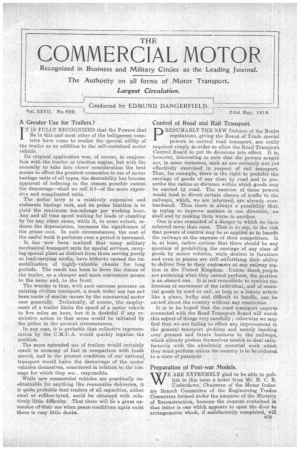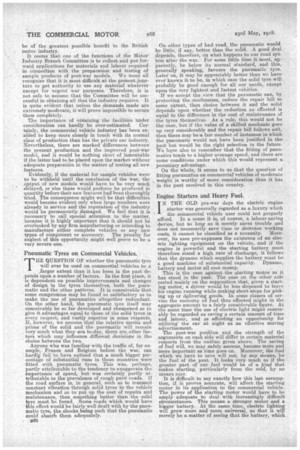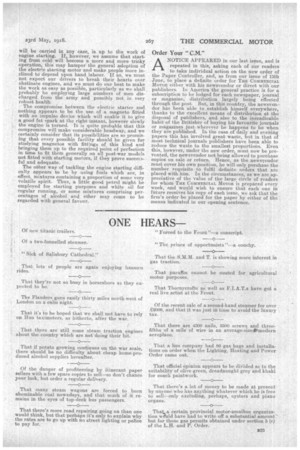A Greater• Use for Trailers?
Page 1

Page 2

Page 3

If you've noticed an error in this article please click here to report it so we can fix it.
IT IS FULLY RECOGNIZED that the Powers that Be in this and most other of the belligerent countries have come to realize the special utility of the trailer as an addition to the self-contained motor vehicle.
Its original application was, of course, in conjunction with the tractor or traction engine, but with the necessity to take into closer consideration the best means to effect the greatest economies in use of motor haulage units of all types, the desirability has become apparent of reducing to the utmost possible extent the demurrage—shall we call it ?—of the more expensive and complicated units.
The motor lorry is a relatively expensive and elaborate haulage unit, and its prime function is to yield the maximum ton-mileage per working hour._ Any and all time spent waiting for loads or standing by for any other cause, while it, to some extent, reduces the depreciation, increases the significance of the prime cost. In such circumstances, the cost of the useful work it performs over a period is increased. It has • now been realized that many military mechanical transport units for special services, carrying special plant as distinct from those serving purely as load-carrying media, have hitherto caused the im.mobilization of highly-valuable chassis for long periods. The result has been to force the claims of the trailer, as a cheaper and more convenient means to the same end, to the front. The wonder is that, with such extreme pressure on existing civilian transport, a much wider use has not been madeof similar means by the commercial motor user generally. Technically, of course, the employment of a trailer limits the speed of a motor vehicle to five miles an hour, but it is doubtful if any restrictive action in that sense would be initiated by the police in the present circumstances. In any case, it is probable that collective representation by the C.M.U.A. would quickly legalize the position. The more extended use of trailers would certainly result in economy of fuel in comparison with loads moved, and in the present condition of our national transport would halve the demurrage of the motor'. vehicles themselves, considered in relation to the tonnage for which they wet responsible.
While new commercial vehicles are practically unobtainable for anything like reasonable deliveries, it is quite probable that trailers of all capacities, either steel or rubber-tyred, could be obtained with relatively little difficulty. That there will be a great extension of their use when peace conditions again exist there is very little doubt. Control of Road and Rail Transport.
pRESUMABLY THE NEW Defence of the Realm regulations, giving the Board of Trade special powers to control road transport, are really required simply in order to allow the Road Transport Control Board to put its decisions into effect. It is, however, interesting to note that the powers sought are, in some instances, such as are certainly not yet effectively exercised in respect of rail transport. Thus, for example, there is the right to prohibit the carriage of goods of any class by road and to pre scribe the radius or distance within which goods may be carried by road. The exercise of these powers would tend to divert certain classes of traffic to the railways, which, we are informed, are already overburdened. Thus there is always a' possibility that. in trying to improve matters in one direction, we shall end by making the-m worse in another. One is also reminded of a danger to which We have referred more than once. That is to say, to the risk that powers of control may be so applred as to benefit ' the railways at the expense of their competitors. it is, at least, rather curious that there should be any question of prohibiting the carriage of any class Of goods by motor vehicles, while dealers in furniture and even in pianos are still a41;ertising their ability to deliver free to their customers at any railway sta tion in the United Kingdom. Unless ,these, people are promising what they cannot perform, the position is an absurd one. It is not reasonable to restrict the freedom of movementof the individual, and of essential goods by road or rail, so long as a luxury article like a piano, bulky and difficult to handle, can be carted about the country without any restriction. It is to be hoped that the road transport experts connected with the Road Transport Board will watch this aspect of things very carefully ; otherwise we may find that we are failing to effect any improvement in the general transport problem and merely handing over .present and future business to the railways, which already profess themselves unable to deal satisfactorilY with theabsolutely essential work which they must perform unless the country is to be reduced to a state of paralysis. , Preparation of Post-war Models.
WE ARE EXTREMELY glad to be able to publish in this issue a letter from Mr. H. C. B. Underdown, Chairman of the Motor Industry Branch Committee of the Engineering Trades Committee formed under the auspices of the Ministry of Reconstruction, because the request contained in that letter is one which appears to open the door to arrangements which, if satisfactorily completed, will be of the greatest possible benefit to the British motor industry. • It seems that one of the functions of the Motor Industry Branch Committee is to collect and put forward applications for materials and labour required in conneetion with the preparation and testing of sample products of post-war models. We must all recognize that it is most difficult at the present juncture to get authority to use any material whatever except for urgent war purposes. Therefore, it is not safe to assume that the Committee will be successful in obtaining all that the industry requires. It is quite evident that unless the demands made are extremely moderate, it will prove impossible to secure them completely. The importance of obtaining the facilities Under consideration can hardly be over-estimated. Certainly, the commercial vehicle industry has been enabled to keep more closely in touch with its normal class of production than has the private ear industry. Nevertheless, there are marked differences between the present production and the improved post-war model, and it would be nothing short of lamentable if the latter had to be placed upon the market without . adequate preparation in the matter of testing all new . features.
Evidently, if the material for sample vehicles were to be withheld until the conclusion of the war, the oytput of new models would have to be very much delayed, or else these would perforce be produced in quantity before their new features had been thoroughly tried. The consequence might well be that difficulties would become evident only when large numbers were already in service and the reputation of the industry would be permanently damaged. We feel that it is necessary to call special attention to the matter, because it is highly important that it should not, be overlooked by any firm manufacturing or intending to manufacture either complete vehicles or any new types of component or accessory. The penalty for neglect of this opportnnity might well prove to be a very severe one.
Pneumatic Tyres on Commercial Vehicles.
TTIE QUESTION OF whether the pneumatic tyre will ever be used on commereial vehicles to a larger extent than it has been in the past depends upon a number of factors. In the first place, it is dependent on possible improvements and changes of design in the tyres themselves, both the pneumatic and the other patterns. It is conceivable that. some compromise may be found so satisfactory as to make the use of pneumatics altogether redundant. On the other hand, the pneumatic tyre itself may conceivably be so far developed and cheapened as to give it advantages equal to those of the solid tyres in every respect, and vastly superior in some respects. If, however, we assume that the relative merits and prices of the solid and the pneumatic will remain very much what they are to-day, there are, other factors which may influence different decisions in the choice between the two.
Anyone who was familiar with the traffic of, for example, France and Belgium before the war, can hardl,y fail to have noticed that a much bigger percentage of substantial vans in those countries were fitted with pneumatic tyres. This was, perhaps, partly attributable to the tendency to exaggerate the importance of speed, but was certainly partly attributable to the prevalence of rough pave roads. If the read surface is, in general, such as to transmit constant vibration through solid tyres to the vehicle mechanism and an to put up the cost of repairs and maintenance, then something better than the solid tyre must be found. Some roads which would have this effect would be fairly well dealt with by the pneumatic tyre, the shocks being such that the pneumatic could absorb them adequately. On other types of bad road, the pneumatic would be little, if any, better than the solid. A good deal depends, therefore, on what happens to our road system after the war. For some little time it must, ape parently, be below its normal standard, and this, generally speaking, favours the pneumatic tyre. Later on, it may be appreciably better than we have ever known it to be, in which case the solid tyre will probably be good enough for all our needs, except upon the very lightest and fastest vehicles. If we ,accept the view that the pneumatic can, by protecting the mechanism, reduce the repair bill to some extent, then choice between it and the solid depends upon whether the reduction so effected is equal to the difference in the cost of maintenance of the tyres themselves. As a rule, this would not be the case, but if the value of a skilled mechanic goes up very considerably and the repair bill follows suit, then there may be a fair number of instances in which the pneumatic would not have been justified in the past but would be the right selection in the future. We have also to remember that the fitting of pneumatics tends to a higher average speed, and there are some conditions under which this would represent a pecuniary advantage. On the whole, it seems to us that the question of fitting pneumatics on commercial vehicles of moderate weight is worthy of more consideration than it has in the past received in this country.
Engine Starters and Heavy Fuel.
IN THE OLD pre-war days the electric engine starter was generally regarded as a luxury which the commercial vehicle user could not properly afford. In a sense it is, of course, a labour-saving device, but so long as it merely saves trouble and does not necessarily save time or decrease working costs, it cannot be classified as a necessity. Moreover, its uses pre-supposes the existence of an electric lighting equipment on the vehicle, and if the engine is powerful and the starting battery must therefore stand a high rate of discharge' it follows that the dynamo which supplies the battery must be a good machine of substantial capacity. Dynamo, battery and motor all cost money. This is the case against the starting motor as it has -stood in the past. The case on the other side rested mainly on the supposition that, given a startingmotor, a driver would be less disposed to leave his engine running while making short stops for picking up or delivering goods. In some classes of service the economy of fuel thus effected might in the aggregate amount to a fairly considerable figure. At the same time the use of electric light might reasonably be regarded as saving a, eertam amount of time and labour, and as affording an opportunity for utilizing the car at night as an effective moving advertisement. The post-war position and the strength of the arguments on each side will differ in certain material respects from the outline given above. The saving of fuel will, we may safely assume, _become more and more important as time goes on. Moreover, the fuel which we have to save will not, by any means, be the fuel of the past. It looks very much as if the greater part of our fuel would be of a kind that makes starting, particularly from the cold, by no means easy. It is difficult to say exactly how this last assumption, if it proves accurate, will affect the starting motor in its application to the commercial vehicle. The power of the starting motor would have to be amply adequate to deal with increasingly difficult circumstances. This means a stronger motor and a bigger battery. At the same time, electric lighting will grow more and more universal, so that it will merely be a matter of seeing that the battery, which will be carried in any case, is up to the work of engine starting. If,. however, we assume that starting from cold will become a more and more tricky operation, this may hamper the general adoption of the electric starting motor and make people more inclined to depend upon hand labour. If so, we must not expect our drivers to break their hearts over obstinate engines, and we must do our best to make the work as easy as possible, particularly as we shall probably be employing large numbers of men discharged from the army and possibly not, in very robust health.
• The compromise between the electric starter and nothing appears to be the use of a magneto fitted with an impulse device which will enable it to give a good fat spark at the right instant, however slowly the engine is turned. It is quite probable that this compromise will make considerable headway, and we certainly consider that its possibilities are so.promising that every possible facility should be given for studying magnetos with fittings of this kind and bringing them up to the required point of perfection in time to fit them generally on all post-war models not fitted with starting motors, if they prove successful and adequate.
The other way of tackling the engine starting difficulty appears to be by using fuels which are, in effect, mixtures containing a proportion of some very volatile spirit. Thus, a little good petrol might be employed for starting purposes and white oil for regular running, or some mixtures comprising percentages of alcohol and ether may come to be regarded with general favour.
Order. Your " C.M."
NOTICE APPEARED in our last issue, and is repeated in this, asking each of our readers to take individual action on the new order of the Paper Controller, and, as from our issue of 13th June, to place a definite order for THE COMMERCIAL MOTOR either with his newsvendor or direct with our publishers. In America the general practice is for a subscription to be lodged for each newspaper, journal or magazine, distribution largely being effected through the post. But in this country, the newsvendor has been able to establish himself everywhere, thanks to the excellent means of distribution at the disposal of publishers, and also to the ineradicable habit of the Britisher of buying his favourite journals or magazines just wherever he happens to be when they are published. In the case of daily and evening papers this has involved great waste, but in that of most technical journals publishers have been able to reduce the waste to the smallest proportions. Even this, however, under the new order, must now be prevented, the newsvendor not being allowed to purchase copies on sale or return. Hence, as the newsvendor must cover his own position, he will only purchase tho number requisite to fulfil definite orders that are placed with him. In the circumstances, as we are appreciative of the value of the large circle of readers for whom THE COMMERCIAL MOTOR is prepared every week, and would wish to ensure that each one in future receives his copy of each issue, we ask that the firm's order be placed for the paper by either of the means indicated in our opening sentence.






















